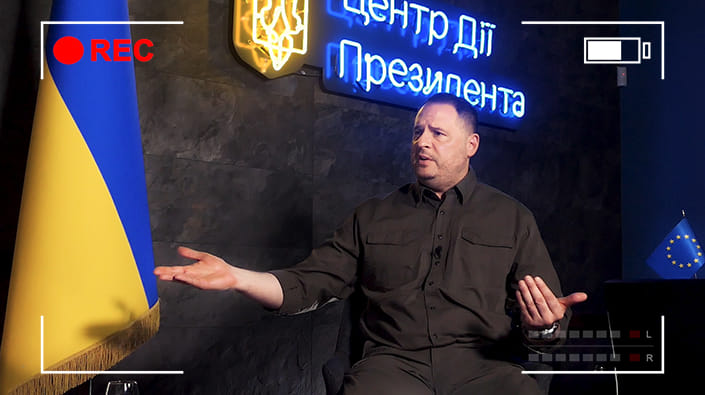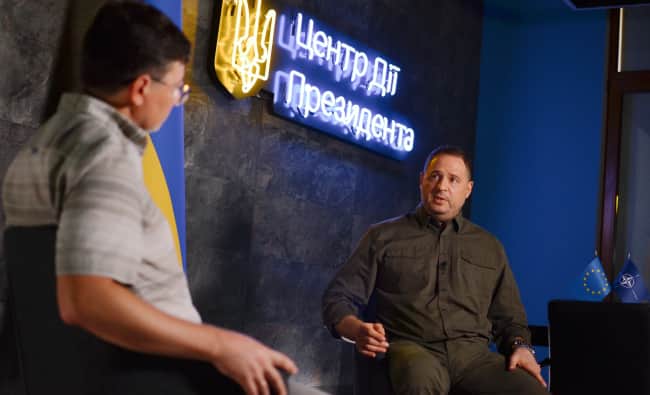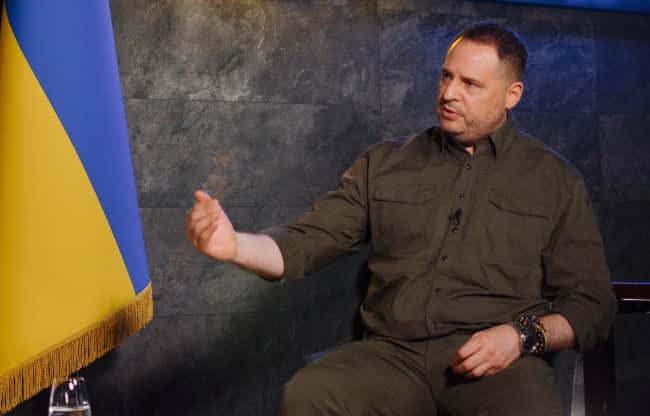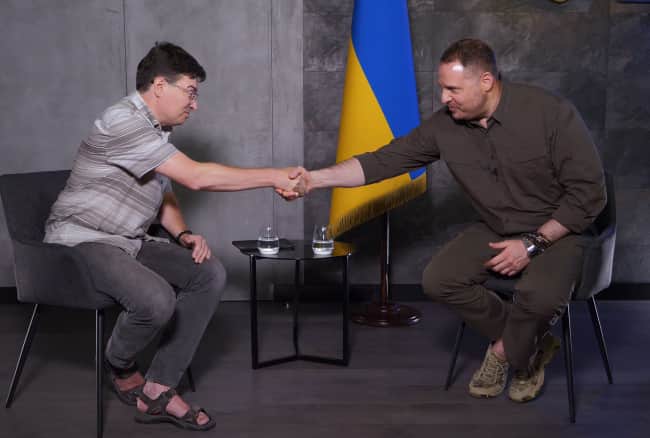First foreign policy interview with Zelenskyy's top aide: Andrii Yermak on peace talks, Putin, China and Trump

It would be difficult, if not impossible, to find a current Ukrainian official with a more controversial image than Andrii Yermak. Critics often point out how powerful Yermak is and say he often has more influence on shaping state policy than the ministers concerned.
And that includes foreign policy. Contacts with the White House, peace summits, presidential negotiations – these are just some of the areas where Yermak’s role is de facto crucial. Although Ukraine's partners don’t seem to mind this (Western diplomats often say they are ready to work with whoever the president appoints), the Ukrainian public has a lot of questions about it, and European Pravda decided to put them to the head of the President’s Office.
This is Andrii Yermak's first major interview focused exclusively on foreign policy.
We hope he will also give an interview to the Ukrainian media on contentious issues of domestic policy. We’ll leave readers to draw their own conclusions from this interview.
"Ukraine’s chief diplomat is the President"
Why do you think I am here to talk to you about foreign policy?
I think you can see that many events are connected to the President of Ukraine, and accordingly, to the President’s Office.
I'm sure you're aware that people are asking why the head of the President’s Office is so involved in foreign policy.
Let me put it this way. In many countries, such as the US, presidents delegate a lot of issues to national security advisers or foreign policy advisers. This format hasn’t been widely used in this country.
However, many of these functions are currently fulfilled by the Office of the President of Ukraine.
No one would argue that the chief diplomat of the country is President Volodymyr Zelenskyy. So, as the head of the President’s Office, I take care of these matters by carrying out the President's instructions.
In this regard, I work as a national security adviser, like Jake Sullivan in the US, Jens Plötner in Germany, and so on.
So perhaps it would make sense to amend the legislation, introduce such a position, and specify that it should be held by the head or deputy head of the Office?
It's not within my authority to amend legislation or even to propose legislative initiatives. Right now, with the war going on, the most important thing is to achieve results. The main result is victory, a just peace, the restoration of [Ukraine’s] territorial integrity, security guarantees against future attacks, and the return of our people.
How do you divide up responsibilities with the Minister of Foreign Affairs, Dmytro Kuleba?
First of all, we have a very good relationship with Minister Dmytro Kuleba and the Ministry of Foreign Affairs in general. But we mustn’t forget that we are up against the vast machine of the aggressor country. They have many agents of influence in every country in the world, especially in the Global South – in diplomacy, in the media, and among those who communicate with regional elites.
Traditional diplomacy has its limits in countering this machine.
You say you don't interfere with the powers of the Foreign Ministry. Where is the line drawn? What does the Foreign Ministry and the minister handle, and where do your tasks begin?
My powers end where the president's instructions end.
And those can vary greatly.
And they do vary. It's a team effort.
By the way, if you followed the president's recent visit to the United States, his trip to Washington wasn’t his only success. He also visited Utah, where he met with many US governors. One of them, Tim Walz, is now Kamala Harris’ vice-presidential candidate.
"Trump understands what this war is about. America will back Ukraine"
Since you’ve mentioned the US, it makes sense to ask: are you in contact with Donald Trump's campaign team?
We’re in contact with both parties. We greatly value the support of the entire American people and the bipartisan support in Congress.
You mentioned meeting Tim Walz. Do you know JD Vance, Trump's running mate?
No, I don’t.
But you know that Trump was in office when Zelenskyy became president. And as you know, there was a recent phone call between Zelenskyy and Trump, and they had a very warm conversation.
This conversation demonstrated the good relationship between us and the great respect Donald Trump has for Ukraine and our president.
The US elections are the business of the American people. But it’s very important for us that both campaigns, both candidates and the people around them clearly understand what is going on in Ukraine. And it's crucial that both candidates have a plan for Ukraine's victory and, I’d like to emphasise, a strategy for victory.
It's said that Trump even told President Zelenskyy not to listen to rumours about his supposed willingness to make concessions to Putin.
Yes, he did say that. [Trump stressed] that we should pay no attention to the fake news circulating about this, that he clearly understands what kind of war this is, and that the US has supported and will continue to support Ukraine. And this is very important.
Will Trump visit Ukraine as part of his election campaign?
I don't know. I think it would be tough, but he has been invited.
If he wins, could he visit Ukraine before the inauguration – is that realistic?
That’s more likely, and it applies to whichever candidate wins. I believe – and there are arguments to support this – that backing Ukraine is the most successful American investment in recent years.
I have to ask about the difference between the vice-presidential candidates. There's Tim Walz, who understands that Ukraine must win and publicly says so and supports us. And then there’s JD Vance, who echoes narratives favourable to Russia.
We realise that they are different people, but we need to work and change this stance. And what I've seen in the media in recent days shows that even JD Vance's rhetoric is changing.
Honestly, I don't believe the United States could have a president who failed to understand the threat posed by Russia and opposed supporting Ukraine.
There have been historic changes between the US and Ukraine. We have become partners; indeed, we have a robust allied relationship. And I don't believe that any subsequent president of the United States will be different.
"Certain conditions must be met for the second Peace Summit to take place"
Let's talk about ending the war and Ukraine's victory. The first Peace Summit has taken place. We’re constantly hearing from President Zelenskyy and from you that a second one needs to be held as soon as possible, preferably this year. Why the rush?
The first Summit was the inaugural one. It was very important that over 100 countries and international organisations participated, mostly at leader level. All these countries were united in their support for Ukraine’s independence, territorial integrity within internationally recognised borders, and sovereignty.
Yes, you might point out that some countries did not sign the final communiqué. We were prepared for that – we knew their positions and we’ve continued to work on them.
With regard to the Second Summit, the President insists that
it can only take place when the common plan is ready.
Zelenskyy's ten-point peace formula was announced in 2022. Those were just points back then. But following the meeting of national security advisers in Jeddah, a decision was made to set up ten working groups in Kyiv, including ambassadors and experts, who have worked out how each of these points would be implemented – what is needed to fulfil each point, specific actions and timelines.
Among the 10 points of the peace formula, there are some on which the world has a common position, so we started with those at the first summit.
And then there are more challenging ones, such as accountability, the withdrawal of Russian troops, and the restoration of territorial integrity.
The President's task now is to organise subject-specific conferences that will formalise these working groups' developments at a high level – either ministers, advisers or, say, ombudsmen for humanitarian issues or parliamentary speakers – in order to ultimately put together this common plan.
We don't want this work to drag on for months.
So will the second summit be this year?
We’ll see. We want it to happen, but there are conditions that must be met for the second summit to take place (in particular, the common plan must be agreed upon by the countries involved).
But first and foremost, we shouldn't treat the second summit as if it were the World Cup, where meetings at adviser level are the qualifying stage, the first summit is the semi-final, and the second summit is the final, where everything will be resolved.
So will there be a second "final"?
That will depend on how many countries back our plan.
But some people are saying that the aggressor country might participate in the second summit!
I hope that our work with the countries that haven’t yet signed the communiqué will lead to them supporting our plan. Because it aligns with what these countries publicly declare! They all talk about UN principles, international law and territorial integrity. Their support is crucial for putting pressure on Russia.
Indeed, a representative of Russia may attend the second Peace Summit, and this plan could be presented to them.
But that doesn’t mean we’d be starting negotiations with Russia. No, that’s not what this is about!
Could Putin represent Russia? Are we ready to meet with him?
I think it’s too early to say who it might be.
"Ukraine in the EU is in China's interest"
We’ve heard from official Russian representatives that Russia will not attend the summit.
But can you imagine Russia saying that if representatives from China, Brazil and all the countries that were at the first summit, are present at the second summit?
It's simple. Russia just won’t come.
If you look at this with emotions put aside, Ukraine’s conditions fully align with the requirements of international law. Ukraine doesn't want anything more than justice.
Even countries that have an unclear position – let’s put it that way so as not to offend them – they all say they want to contribute, to help bring about an end to the war, to achieve a just peace.
If you support territorial integrity, where is your signature? Why don't you show your support?
And believe me, no one – or at least the vast majority of countries – will be able to call black white.
They might. But I want to ask you more about this future plan. Ukraine presented only three points of the peace formula at the first Peace Summit. Do we plan to present all 9-10 points at the second summit?
I can't say for sure.
But if there is even a small chance that the second summit will bring us closer to ending the war, to achieving a just peace – and that means, just to be clear, victory for Ukraine…
Because what is victory? Victory is the restoration of Ukraine's territorial integrity. Victory is security guarantees. Victory is the return of all our people.
Victory is holding war criminals accountable. Victory is obtaining compensation to rebuild our country. Victory is the return of all Ukrainian children. Victory is a new security architecture in Europe in which Ukraine will definitely play a leading role.
The things you’re saying contradict each other. The way you described victory is indisputable. But you also say that the whole world, including China and Brazil, could unite around these points, but that's not true, that's not the case.
For now, yes, I agree.
Only about half of the participants in the Peace Summit agree on the issue of holding war criminals accountable or paying reparations. The plan for the withdrawal of Russian troops cannot be drafted without Russia. And yet you say that we will draw up a victory plan and every country will sign it. That's not the case!
I agree that not all the points have the prospect of being supported by the majority of countries.
However, holding people accountable, for example, does not require the support of all countries. We understand that some countries, due to their national or historical issues, will not agree to this. That doesn't mean they don't support Ukraine. We must respect that.
But there are key points where it is crucial to have the majority of countries on board.
For instance, when you mention the withdrawal of troops as a challenging point, I would ask: how else do you restore territorial integrity? And everyone supports that.
Yes, this requires careful and delicate work. We need to find an approach to those countries that have not yet signed the communiqué. They need to see that it’s in their national interest for Ukraine to be a strong, independent state within its internationally recognised borders.
For example, I believe that Ukraine within the EU is a very important market for China, and this aligns with China's interests.
"We’ve had a very bad experience with mediators"
Some partners suggest that compromising is possible, which means concessions. Is Ukraine ready to make concessions in implementing the 10 points of the Peace Plan?
Under President Zelenskyy, there will never be another Minsk, nothing that Ukrainian society wouldn't accept, and nothing that goes against Ukraine's interests.
Is Ukraine ready to make concessions in the wording of the peace plan points? Territorial integrity?
Every point of the formula has absolutely clear answers... What other form of territorial integrity could there be besides Ukraine's internationally recognised borders?
I need a direct answer as to whether Ukraine is ready to make concessions.
What do you think? Are the Ukrainian people – those who have lost their loved ones, those on the front lines – ready to make compromises?
And if polls showed that society was ready, would you be ready too?
If you ask people today – people on the front lines, in Kherson, in Kharkiv – if they are ready [to compromise], I think they would be surprised by the question.
We’ve already compromised once. We had Minsk, the Normandy Format. And Russia used that time to prepare [for a new invasion].
Any frozen conflict, any unresolved or unjustly resolved issue, always carries the risk of exploding in the future.
I believe that President Zelenskyy's plan is intrinsically uncompromising. We are not prepared to compromise when it comes to Ukraine's independence, territorial integrity and sovereignty.
Many countries want to mediate Ukraine’s negotiations with Russia. Are there any criteria for who could theoretically be a mediator and who could not? One obvious criterion is that the mediator must not support Russia during this aggression. Are there any others?
We have had a very bad experience with mediators.
The Normandy Format showed that having a mediator who just sits at the table does not help, even though our German and French friends genuinely wanted to help.
But if, for example, we have an internationally agreed plan to bring back Ukrainian children, with criteria, conditions and agreed-upon security guarantees, then countries that support our overall peace plan but still maintain some relations with the aggressor state could help implement such a plan.
Such countries could assist us.
But not in a way that helps the aggressor, not by whitewashing its reputation.
And such countries exist! There’s Qatar, and there’s the Vatican, which is making efforts to help.
We had the experience of negotiations with Russia on the grain corridor, mediated by Türkiye and the UN.
We did not have negotiations with Russia. We had negotiations with Türkiye and the UN, and they negotiated with Russia.
It was a success. The corridor operated for a year – there were a lot of problems, but it worked. We must acknowledge that.
A similar format could be used again.
"I’m not saying that everything is good between us and China"
Are there any red lines for selecting countries and organisations that could be mediators? Could Türkiye or China be among them?
Countries that have influence over Russia – yes, they definitely could be.
Meanwhile, the US has called China an enabler of Russia's war. Doesn’t that matter?
It does matter. You know, Minister Kuleba was recently in China, talking with his counterpart [Minister Wang Yi] about this among other things. China’s Special Representative [Li Hui] was in Kyiv a few months ago. We had several hours of very candid discussions about it.
I’m not saying that everything is good [between us and China]. But China definitely has significant influence over Russia.
But China is afraid to say that it supports Ukraine's territorial integrity. This wasn't even in the Chinese Foreign Ministry statement after the meeting with Kuleba.
That’s true, it wasn’t. But Special Representative Li Hui did speak about it in Jeddah. In meetings at the working group level, the Chinese ambassador also stated that China supports Ukraine’s territorial integrity.
You’re right, I didn’t see that in the official statements after the ministerial meeting either. Well, we need to work on it.
I’m a realist, but I believe that explaining things, even if you have to do it a hundred times, and finding common interests gets results. And not only with China – we have made some progress with India, and I think you will see some results in the future. We need to do the same with Brazil. Another example is the visit [to Kyiv] by the South African president and a group of African leaders, which has had a significant impact.
Let’s talk about Hungary. We waited so long for a meeting between Zelenskyy and Orbán, and it finally took place. What’s next?
It’s very good that the meeting took place.
And then Orbán went to Moscow and China?
Yes, Orbán went to Moscow and China. We didn’t know about those plans. And we don’t support or share his rhetoric.
But Hungary is our neighbour. Hungary is a member of the European Union and NATO.
That means we have to work towards having normal, working, neighbourly relations with Hungary. It’s not easy.
We need to talk, and it’s good that this dialogue is happening.
Hungarian Foreign Minister Peter Szijjártó was at the Peace Summit, but he didn’t even come to the joint photo session. He wasn’t in the plenary hall, he avoided everyone.
Those who needed to see him did see him.
He was at our panel on bringing back the abducted children. He arrived late, but he came, and he spoke very well. He said that Hungary was ready to do whatever is necessary and offered to get involved if needed.
I’m not saying we don’t have issues. We have plenty of them. But our strategic interest is to have normal, good-neighbourly relations with them.
Are you aware that Orbán actually has no interest in solving the so-called Hungarian minority issue? That he doesn’t care about the minority, but is using Ukraine as a tool to blackmail Brussels and get money out of them?
My answer to that is: we need to ensure that there are no such issues or conjectures. So that there’s no chance of such moments being exploited. Ukraine has done almost everything it can to ensure this.
To make positive progress in our relations with Hungary, Ukraine needs to make some concessions. Specifically, the 11 points that Szijjártó handed over during the meeting in Uzhhorod require amendments to Ukrainian legislation. Are there any red lines in these concessions?
Let me describe that meeting. When we were alone with Péter Szijjártó and Dmytro Kuleba, we had a very frank discussion.
We said: look, you want to return as far as possible to the legislation that was in place a few years ago. We have a clear understanding of the issues where this is not possible. But please explain what you see as the problem now. And we are prepared to look for a way out, while at the same time, we are aware that the Hungarian community in Zakarpattia Oblast is mostly Ukrainian citizens.
So, in some areas we are ready to meet you halfway, where we don’t see risks for Ukraine. And in other areas, we are ready to offer solutions based on our national interests. We are ready to discuss this with you.
To do this work, we have set up a group that all the relevant ministers will attend. They are discussing it, and the work is ongoing. And I know that Prime Minister Viktor Orbán noted at a meeting with the Ukrainian president that he welcomes the way this conversation is going.
What are our red lines?
The only red line is our national interests. That includes sovereignty and the unity of the country. We could talk about this for hours. But overall, it’s about our national interests and our security.
Meanwhile, we’ve stopped the transit of oil from Lukoil. It feels like we did this to hurt Orbán.
First of all, the sanctions policy should not be weakened. Sanctions work. They definitely hurt Russia and its military machine, and every year they will hurt them more. So discussions about easing sanctions can only happen when Russia withdraws its troops and stops its aggression.
But our sanctions against Lukoil are not an instrument against Hungary at all.
Should we stop the transit of Russian oil and gas altogether?
In the long term – absolutely.
I can’t say when exactly. I’m not an expert. But from a security and political standpoint, I can say that anything that enables the Russian military machine to continue operating should be stopped.
We can’t ignore Poland and the expectation that Polish air defence would help Ukraine intercept missiles and drones. That hasn’t happened.
First of all, Poland is our friend and ally.
What I can say is that consultations with Poland on this matter are ongoing. I wouldn’t want to say any more about this very sensitive issue.
There are also expectations from the West regarding permission to strike deep into Russia with long-range weapons. Is there any change there?
We believe that having the right to such strikes is absolutely fair.
A Russian missile hit Okhmatdyt [the Kyiv children's hospital]. How can we limit our response to that?
But the US imposes these restrictions.
This is a complex issue. We need to start by acknowledging that without the help of our partners – first and foremost the US – we would have a completely different situation, to put it mildly. That has to be respected.
Sergiy Sydorenko
Editor, European Pravda
Translated by Daria Meshcheriakova



